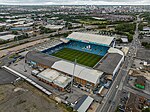Leeds United F.C.
Leeds United Football Club is a professional football club based in Leeds, West Yorkshire in England. The club play their home matches at Elland Road and compete in the Championship, the second tier of the English football league system. Leeds United have won the League Championship three times, four Second Division titles, the FA Cup once, the EFL Cup once, the Charity Shield twice and the Inter-Cities Fairs Cup twice. The club had their most successful period under the management of Don Revie in the 1960s and 1970s, when they won the League title twice, the FA Cup once, the League Cup once and the Inter-Cities Fairs Cup twice. The club have also been runners-up five times in the League Championship, three times in the FA Cup, once each in the EFL Cup, the Charity Shield, the Inter-Cities Fairs Cup, the Cup Winners' Cup and the European Cup, and lost the play-off to keep the Inter-City Fairs Cup trophy.The club has rivalries with Manchester United and Chelsea. The team's traditional kit colours are white shirts, white shorts and white socks. Their badge features the White Rose of York, which is a symbol of Yorkshire. "Marching on Together" is the club's official anthem and is regularly sung by supporters.
Excerpt from the Wikipedia article Leeds United F.C. (License: CC BY-SA 3.0, Authors).Leeds United F.C.
Elland Road, Leeds Beeston
Geographical coordinates (GPS) Address Nearby Places Show on map
Geographical coordinates (GPS)
| Latitude | Longitude |
|---|---|
| N 53.777777777778 ° | E -1.5722222222222 ° |
Address
Leeds United FC
Elland Road
LS11 8TU Leeds, Beeston
England, United Kingdom
Open on Google Maps






